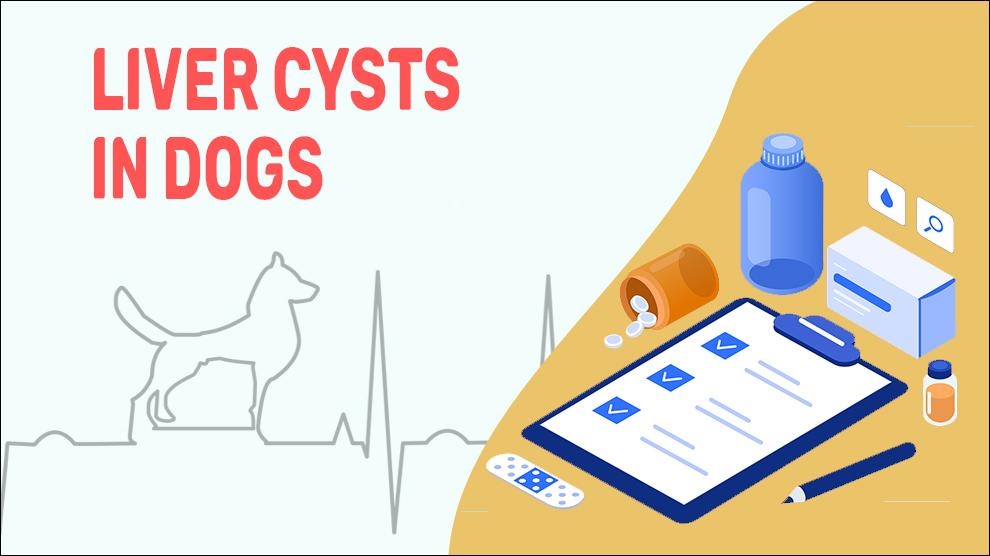What Is Liver Cysts In Dogs?
Liver cysts (hepatic cysts) are benign, congenital fluid-filled or the solid mass of cells in the liver in dogs. Usually, they are asymptomatic - cause no signs or symptoms, and don’t require any treatment.
However, occasionally they may be large enough to hamper the function of the liver or interfere with bile flow or they can also be a part of underlying liver diseases.
Typically liver cysts are small, occasionally some may become large enough to cause pain, distension, or discomfort, then drainage or removal of the cysts may be required.
Sometimes, pets may have multiple cysts and the complications are so uncommon. These may be part of underlying conditions such as polycystic liver disease or even liver injuries. Rarely, some cysts may be malignant and these cysts are called cystadenocarcinoma or simply, cystadenoma.
Cysts of the liver can crop up at any time during a dog’s life for reasons vets have yet to discover.
Symptoms Of Liver Cysts In Dogs
Only 5-10% of liver cysts can cause symptoms:
- Protruding or distended stomach
- Bloating or abdominal pain
- Feelings of abdominal fullness
- Lethargy
- Nausea and vomiting
- Excessive thirst
Treatment Options For Liver Cysts In Dogs
Treatment is not necessary for most liver cysts. However, rarely do cysts get large and cause discomfort or other symptoms, then they will be drained or surgically removed.
Fenestration: This is a minimally invasive procedure quite similar to removing the top of a large blister. Using a laparoscopic (keyhole) approach, the surgeon removes the thin lining on the outside of the cyst and this will make the contents of the cyst drain. The left-behind cyst is then cauterized.
Home Remedies For Liver Cysts In Dogs
Follow the instructions given to you by your veterinarian for the entire recommended time period. No matter how badly you want relief for your dogs or what you hear from other dog owners, talk with your vet before trying any home remedy.
Make sure to provide plenty of drinking water.
If any specific diet has been suggested to your dog, follow the diet very strictly, and never provide or allow others to give your dog treats or other food.
How To Prevent Liver Cysts In Dogs?
Liver Cyst's etiology is poorly understood. Specific causes are not yet known. However, Hereditary is, perhaps a factor in some breeds and it is better to evaluate the affected dogs before breeding or at least before getting a dog from a susceptible lineage and get the health checks done.
Affected Dog Breeds Of Liver Cysts
Cairn Terrier, Bull Terrier, Beagle, West Highland White Terrier, Maltese, Bedlington Terrier, Cocker Spaniel, Chihuahua, Doberman Pinscher, Maltese, Labrador Retriever, Standard Poodle, Skye Terrier, Springer Spaniel
Causes And Diagnosis For Liver Cysts In Dogs
Causes: It is still unclear what triggers liver cysts.
Cysts may be congenital or acquired.
- Congenital Cysts: This is a hereditary anomaly in the liver and affected dogs are born with the cysts.
- Acquired Cysts: This is a result of infections, trauma, and exposure to toxins, and harmful chemicals.
Morbidity:
Liver cysts are usually benign, which means they are non-cancerous. Occasionally, liver cysts can grow or multiply large enough to affect liver function.
Very rarely, these cysts can become malignant and can metastasize beyond the liver.
Mortality:
There is no documented mortality due to this condition.
Diagnosis:
- Ultrasound
- MRI
- CT scan
- Blood tests to determine parasitic infection
Prognosis:
The prognosis for Liver cysts is really good. As the existing condition is not life-threatening, no rigorous treatment is usually necessary. However, relapse is possible following medical treatment in affected dogs. Proper hygiene and home care are the best defenses against future recurrences.
When To See A Vet For Liver Cysts In Dogs?
It’s better to set up an appointment with your veterinarian if you notice -
- Protruding or distended stomach.
- Continuous pain in the upper-right part of the stomach.
Food Suggestions For Liver Cysts In Dogs
Nutrient-dense, vitamin-rich fruits and veggies:
- Legumes, such as lentils, peas, or beans
- Cauliflower, cabbage, broccoli
- Spinach, kale
- Tomatoes
- Citrus, such as oranges and limes
- Avocadoes, blueberries, blackberries, raspberries
High-fiber foods:
- Whole grain bread, rice, and cereal
- Green beans, peas
- Psyllium husk
- Beet Pulp
- Flaxseed
Conclusion
As most cysts for affected dogs are incidental and benign, they do not require treatment or monitoring over time. The Prognosis is also excellent. Some cysts are large and hamper liver function or block the bile flow, they are warranted for long-term monitoring every 3-6 months.

















